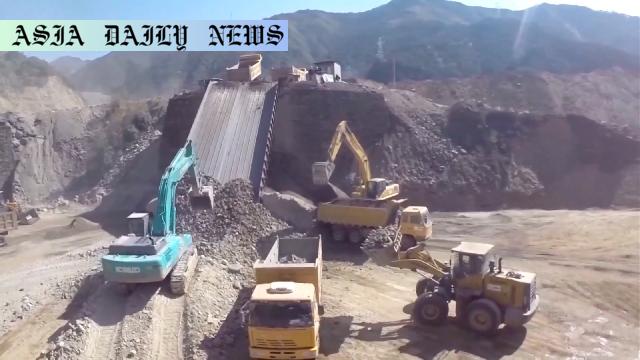Rare earth metals: Japanese firms propose easing Chinese export restrictions to improve EV motor and electronics production.
- China provides over half of Japan’s rare earth metal supply for EV and electronics production.
- The Japanese Chamber of Commerce proposes measures to ease China export restrictions.
- Beijing introduced rare earth curbs in April as retaliation against US tariffs.

The Importance of Rare Earth Metals in Global Trade
Rare earth metals are indispensable resources in the modern industrial era, playing a pivotal role in manufacturing electric vehicles (EVs), consumer electronics, renewable energy systems, and advanced defense technologies. Japan, as a leading industrial nation, heavily relies on these critical elements, with China being its major supplier, providing over 50% of its rare earth metal needs. However, recent geopolitical tensions and China’s decision to impose export curbs in April, ostensibly as a countermeasure to U.S. tariffs, has underscored the vulnerabilities of global supply chains. This situation forces dependent countries like Japan to reevaluate their trade policies and strategies for securing essential materials.
Japan’s Proposals to Alleviate Export Restrictions
Recognizing the gravity of the ongoing restrictions, the Japanese Chamber of Commerce and Industry in China stepped forward with proposals aimed at easing the export curbs. On May 28, representatives presented a comprehensive plan to China’s commerce ministry. Their recommendations emphasized the need for accelerated screening processes and improving coordination between central and regional Chinese authorities. By addressing these systemic bottlenecks, Japanese firms hope to stabilize the supply chain and minimize disruptions.
Progress in Bilateral Discussions
Positive signs have emerged from these engagements. According to reports, the Chinese authorities signaled a willingness to make business operations smoother. Early breakthroughs include preliminary approvals for specific product exports, raising optimism that cooperation could mitigate the impact of strict export measures. This development underscores the importance of diplomacy and multilateral cooperation in resolving trade-related frictions.
Geopolitics and the Future of Rare Earth Supply Chains
China’s export controls demonstrate how geopolitical dynamics can influence resource availability, with broader implications for global industries. These measures are part of China’s strategy to wield its dominance in the rare earth market as leverage against economic adversaries, such as the United States. For Japan, these developments highlight the importance of fostering diversified supply chains and reducing dependency on a single source. This may involve bolstering domestic production, exploring alternative markets, or investing in advanced recycling technologies to reclaim rare earth metals from discarded products.
Conclusion: Navigating a Complex Future
The ongoing situation with China’s rare earth export restrictions serves as a wake-up call for Japan and other nations reliant on critical materials. While the immediate focus is on easing export bottlenecks, a long-term strategy centered around resilience and self-reliance is imperative. Policymakers, industry leaders, and stakeholders must collaborate to ensure a stable and sustainable supply chain for rare earth metals, balancing immediate economic needs with future challenges.



Commentary
The Critical Role of Rare Earth Metals in Industrial Development
The rare earth metals issue presents a compelling case study of how geopolitical factors intersect with industrial and economic needs. Nations like Japan, which depend heavily on these materials for the production of EVs, electronics, and renewable technologies, are finding themselves in a precarious position due to China’s recent export restrictions. China’s decision to impose these curbs as a response to U.S. tariffs demonstrates the interconnectedness of global economies and the risks that come with an overreliance on a single supplier or trading partner.
Japan’s Proactive Approach to Address Trade Challenges
In the face of these challenges, Japan’s strategy to engage directly with Chinese representatives through its Chamber of Commerce and Industry showcases a measured, proactive approach. Rather than escalating tensions, Japan has sought to present practical solutions aimed at easing trade bottlenecks and maintaining stable economic ties. This approach not only serves to protect Japanese industries but also sets a precedent for diplomatic problem-solving in the realm of international trade relations.
The Need for a Long-Term Vision
While addressing immediate challenges is essential, the ongoing situation highlights the need for a broader, long-term vision. Countries must work to diversify their supply chains and invest in technologies that can reduce dependency on limited, geographically concentrated resources. For Japan, this might include advancements in recycling technologies for rare earth recovery, establishing partnerships with emerging suppliers, and fostering research into alternative materials that can fulfill the same industrial functions. Such strategies will be vital in building resilience against future geopolitical or market disruptions.
Lessons for Global Stakeholders
The case of China’s rare earth restrictions offers valuable lessons for governments, businesses, and policymakers worldwide. As industries become increasingly globalized and interdependent, securing critical resources while maintaining collaborative and stable international relations will become a key challenge of the 21st century. By advocating for smoother trade and exploring self-reliance, Japan is charting a path that other nations could emulate to navigate the complexities of modern geopolitical realities.